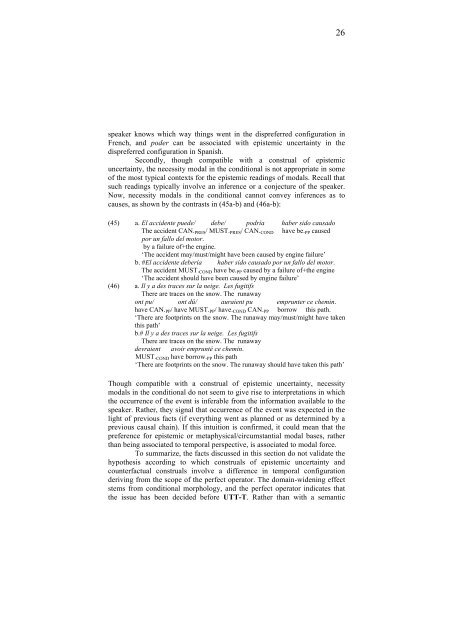On modal tenses and tensed modals - UMR 7023 - CNRS
On modal tenses and tensed modals - UMR 7023 - CNRS
On modal tenses and tensed modals - UMR 7023 - CNRS
You also want an ePaper? Increase the reach of your titles
YUMPU automatically turns print PDFs into web optimized ePapers that Google loves.
26<br />
speaker knows which way things went in the dispreferred configuration in<br />
French, <strong>and</strong> poder can be associated with epistemic uncertainty in the<br />
dispreferred configuration in Spanish.<br />
Secondly, though compatible with a construal of epistemic<br />
uncertainty, the necessity <strong>modal</strong> in the conditional is not appropriate in some<br />
of the most typical contexts for the epistemic readings of <strong>modal</strong>s. Recall that<br />
such readings typically involve an inference or a conjecture of the speaker.<br />
Now, necessity <strong>modal</strong>s in the conditional cannot convey inferences as to<br />
causes, as shown by the contrasts in (45a-b) <strong>and</strong> (46a-b):<br />
(45) a. El accidente puede/ debe/ podría haber sido causado<br />
The accident CAN.PRES/ MUST.PRES/ CAN.COND have be.PP caused<br />
por un fallo del motor.<br />
by a failure of+the engine.<br />
‘The accident may/must/might have been caused by engine failure’<br />
b. #El accidente debería haber sido causado por un fallo del motor.<br />
The accident MUST.COND have be.PP caused by a failure of+the engine<br />
‘The accident should have been caused by engine failure’<br />
(46) a. Il y a des traces sur la neige. Les fugitifs<br />
There are traces on the snow. The runaway<br />
ont pu/ ont dû/ auraient pu emprunter ce chemin.<br />
have CAN.PP/ have MUST.PP/ have.COND CAN.PP borrow this path.<br />
‘There are footprints on the snow. The runaway may/must/might have taken<br />
this path’<br />
b.# Il y a des traces sur la neige. Les fugitifs<br />
There are traces on the snow. The runaway<br />
devraient avoir emprunté ce chemin.<br />
MUST.COND have borrow.PP this path<br />
‘There are footprints on the snow. The runaway should have taken this path’<br />
Though compatible with a construal of epistemic uncertainty, necessity<br />
<strong>modal</strong>s in the conditional do not seem to give rise to interpretations in which<br />
the occurrence of the event is inferable from the information available to the<br />
speaker. Rather, they signal that occurrence of the event was expected in the<br />
light of previous facts (if everything went as planned or as determined by a<br />
previous causal chain). If this intuition is confirmed, it could mean that the<br />
preference for epistemic or metaphysical/circumstantial <strong>modal</strong> bases, rather<br />
than being associated to temporal perspective, is associated to <strong>modal</strong> force.<br />
To summarize, the facts discussed in this section do not validate the<br />
hypothesis according to which construals of epistemic uncertainty <strong>and</strong><br />
counterfactual construals involve a difference in temporal configuration<br />
deriving from the scope of the perfect operator. The domain-widening effect<br />
stems from conditional morphology, <strong>and</strong> the perfect operator indicates that<br />
the issue has been decided before UTT-T. Rather than with a semantic

















